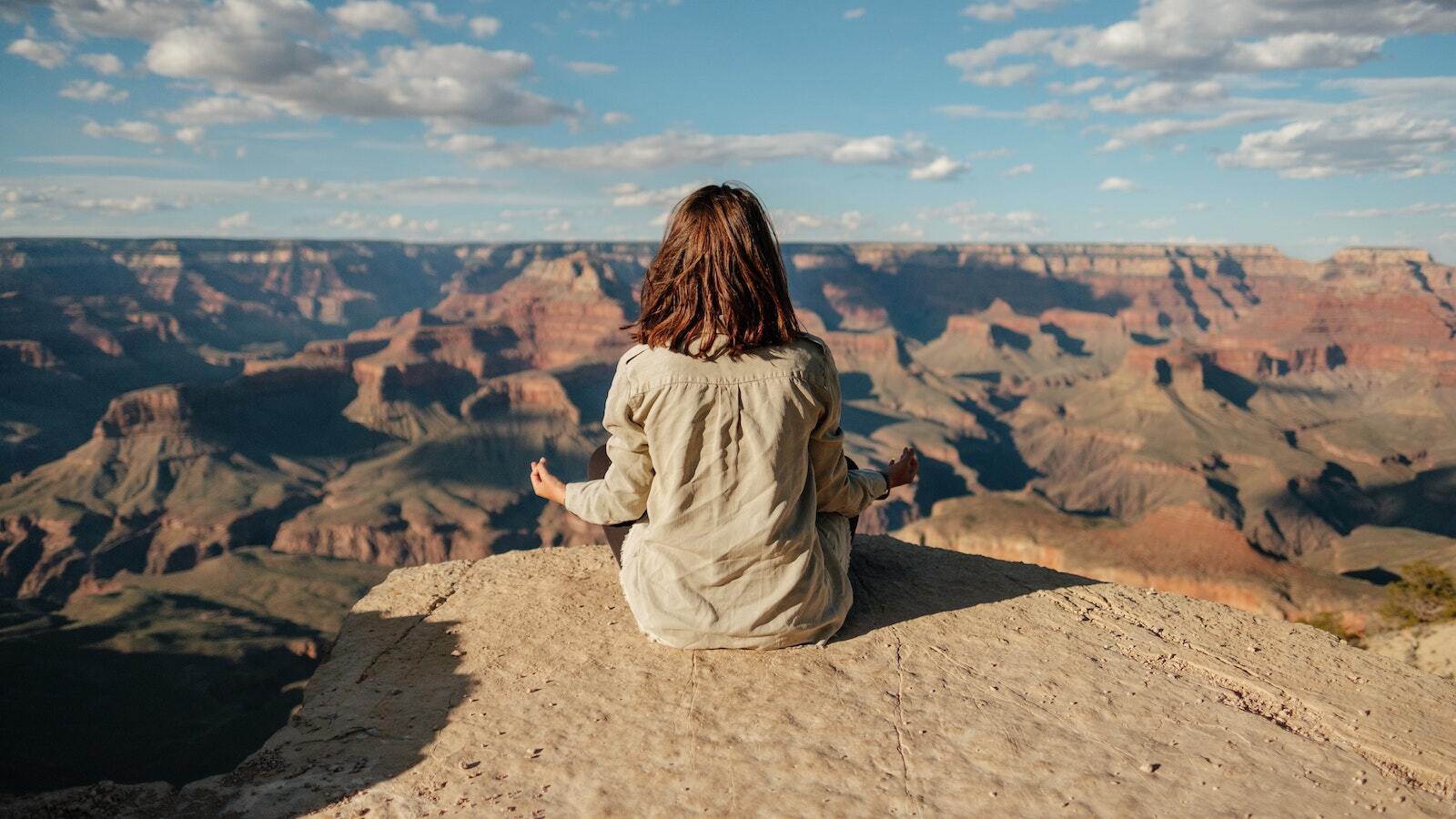Guided Meditation: The Art of Letting Go
In this short guided meditation, excerpted from one of his virtual meditation workshops, Craig invites you to leave behind the cares and concerns of...
6 min read
 Craig Hamilton
:
Jun 18, 2020 1:00:00 AM
Craig Hamilton
:
Jun 18, 2020 1:00:00 AM

We all know that where the rubber meets the road on the spiritual path is amidst the challenges and complexities of living our daily lives.
From our intimate relationships to our workplaces, from making big decisions to navigating conflicts, the real fruits of our spiritual practice emerge in the day-to-day.
But how exactly can we bring spiritual practice-and spiritual awakening-into our daily lives?
Is it enough just to meditate once a day and hope that the meditation carries over into the rest of our activities?
Or are there potent spiritual practices that we can do off the meditation cushion and amidst the dynamism and swirl of daily living?
As you probably know, I am very passionate about the power of meditation and other contemplative, inner practices.
But through my work with tens of thousands of seekers over the past decade, I've come to believe that for our spiritual practice to be truly transformational, we need to find a way to bring it into every moment of our lives, until everything we do is infused with the energy and wisdom of enlightenment.
For many of us, our first association with the idea of spiritual practice is meditation. So, naturally, when we try to bring spirituality into our daily life, we experiment with trying to extend meditative awareness throughout our day.
If you meditate, chances are you've experienced some degree of inner peace, expanded awareness or clarity and then tried to carry that meditative state with you while going through your daily life. And you probably discovered that trying to stay in meditation amidst the activities of daily living doesn't really work. Or, at least, it doesn't work very well. Here's why:
In meditation, you have the luxury of simply sitting still, doing nothing and then allowing yourself to engage in subtle practices of opening your consciousness to something deeper.
But in daily life, you're moving. You're engaged. Things are happening, quickly. Reality is occurring, and you're right in the middle of it. In the midst of all this chaos, it's not really advisable-or even possible-to slow everything down the way we do in meditation so that you can simply pay attention to the deeper layers of consciousness.
So although there can be benefits to trying to stay calmer and more centered throughout our day, if we want to live deeply engaged and creative lives, these practices aren't enough to truly infuse our lives with the energy of spiritual awakening. They don't teach us how to actually bring spirit into the world through our own actions.
Instead of trying to maintain meditative awareness in the midst of our busy lives, I advocate what I call "awakened life practices." These complement our meditation practices, but they're not actually about meditation at all. They're about engaged spiritual practice. They're about turning every moment of our daily life, or at least a significant portion of it, into a domain of spiritual practice. That means practicing being free and awake as we go through all the ups and downs of life.
Think about it. We all spend the vast majority of our time engaged with the activities of life. We're out living our lives, taking care of our responsibilities, engaging with other people, creating projects, etc. So, if we can turn all of life into an active spiritual practice, we can expand our spiritual practice period from meditating 30 to 60 minutes a day to potentially practicing up to 10, 12, or even 16 hours a day. It's possible to turn every waking hour into a kind of practice that we do as we're doing everything else.
This domain of awakened life practice is really where our spiritual awakening gets put to the test. It's almost a cliché in spiritual circles that a person goes away on the retreat or workshop, has a really powerful experience, and comes back feeling very opened up.
Then when they have to go to work and re-engage with their family and responsibilities, the profound experience evaporates and they go back to being the person they were, almost overnight. They get depressed because they feel that their awakening didn't last. Nothing stuck. They think, "I'm back to where I was, so what good was it anyway?"
You can avoid this common spiritual collapse by learning how to consciously practice living your life in a way that's an expression of awakened consciousness, that's aligned with your true nature. If you can do this, you'll find that you can stabilize your awakening and sustain it through the tests and the challenges you face in your life.
Awakened life practice, in essence, means living our life as a conscious expression of the natural, enlightened attributes or postures of our true nature. We learn to practice awakened living by studying the nature of awakened consciousness. We look at how awakened consciousness manifests-its qualities and natural dispositions-and then we build practices to apply those dimensions directly in our lives. We want to become an expression of the dynamic, engaged dimension of awakening.
Awakened consciousness manifests in different ways in our lives. And there are many postures or orientations that we can take to practice awakened living. I'll be exploring several of these orientations in-depth in future articles, but I want to give you a taste of what I'm talking about here.
One of the most common meditation postures, and one that's a big part of how I approach the practice, is learning to simply let everything be as it is. When practiced in earnest, this practice of simply being leads to an experience of radical contentment. In this experience, we become deeply content with what is.
This doesn't mean that we don't want to change things in the world, but on a fundamental, existential level we are at peace with reality. We are allowing life to happen without fighting it, resisting it, or trying to change it. It's a way of practicing a posture of contentment, whether or not you feel particularly content in any moment.
But there's an active, engaged version of this posture as well. And it's not about just letting things happen in the world without reacting or interfering or trying to change things. The truth is that life tends to need our intervention. We have to participate in the unfolding life process, which means dynamically steering our lives and actively contributing our energies to the many situations in which we find ourselves each day.
When you're practicing radical contentment in the midst of your life, it takes several forms. First, letting everything be means stepping into a kind of fluidity in how you relate to your life, to your experience, and to others. When you choose to accept reality as it is, you stop getting in the way of the natural flow of life. Your intuition kicks in and you begin to respond more accurately and appropriately. You're not just letting things happen to you. Sometimes you have to step in and change course or stop a certain momentum. But you're not holding on to anything too tightly or swimming against the natural current of the moment.
Second, when you're practicing letting things be in daily life, you stop avoiding or denying the way things are. Because you've made a fundamental choice to face reality as it is, you no longer avoid difficult subjects or truths. You are leaning into the way things are, striving to see your life and life in general, exactly as it is, without distortions. This gives you an unusual freedom from bias and opens the door to a radical clarity and wisdom.
Finally, the active practice of letting everything be gives birth to a deep kind of vulnerability. When you are deeply content, you let your defenses down and stop the game of constantly trying to protect yourself. This allows for a profound vulnerability with yourself and others.
Another meditation practice I teach is taking the position of not knowing, or letting go of the need to know anything, which opens us to a deep place of innocence and humility. This practice has many dimensions: letting go of your mind, not holding onto concepts, not needing to know. In meditation, because we don't have to do anything other than sit still, we can take a very absolute stance on this point. We can fully disengage with our minds and thoughts.
But if you want to experience the power of "not-knowing" in your daily life, you need a different approach than you took in meditation. We can't just completely disengage from our thoughts while we're going through our day. In life, we engage with concepts all the time. We think about issues. We solve problems and create things. We're very engaged with the mind. So the awakened life version of not-knowing is really about giving up the emotional need for certainty. We practice not holding on to knowing, not needing to know, being open to what we don't know.
What does life look like when we no longer need to know? We're no longer personally, or egoically, identified with knowing, or being "the one who knows." This leads to a kind of humility, open-mindedness, and interest. We're humble in the face of life and how big and how complex it is. We don't grasp onto overly simple solutions, nor do we hold onto ideas just to feel safe and secure in an insecure world. We're more interested in what we don't know than what we do know.
Paradoxically, this fundamental posture of not-knowing-of receptivity and open, innocent interest-actually enables us to see everything more clearly, to have better judgement, to find more creative solutions to problems. Our willingness to not know ultimately transforms our knowing and connects us with a profound source of wisdom that informs every aspect of our lives.
These are just two examples of what it means to bring spiritual practice off the meditation cushion and into your daily life in a way that is aligned with the nature of awakening itself. These awakened life practices are powerful because they reflect the natural emergence of awakened consciousness in the world. They reflect how your true nature wants to show up and engage with the world in every moment. In that sense, these postures represent the intersection of enlightenment and life
When done consistently, awakened life practice is an opportunity to turn every moment of your day into a spiritual practice and to ultimately transform your entire life into a spiritual experience.
-Craig Hamilton

In this short guided meditation, excerpted from one of his virtual meditation workshops, Craig invites you to leave behind the cares and concerns of...

In this 35-minute audio, excerpted from module 7 of Craig’s Integral Enlightenment 9-week course, he shares the four essential principles of the...

Spiritual awakening reveals to us a stainless, unbroken perfection at the heart of reality. Always arresting in its purity, the discovery of this...